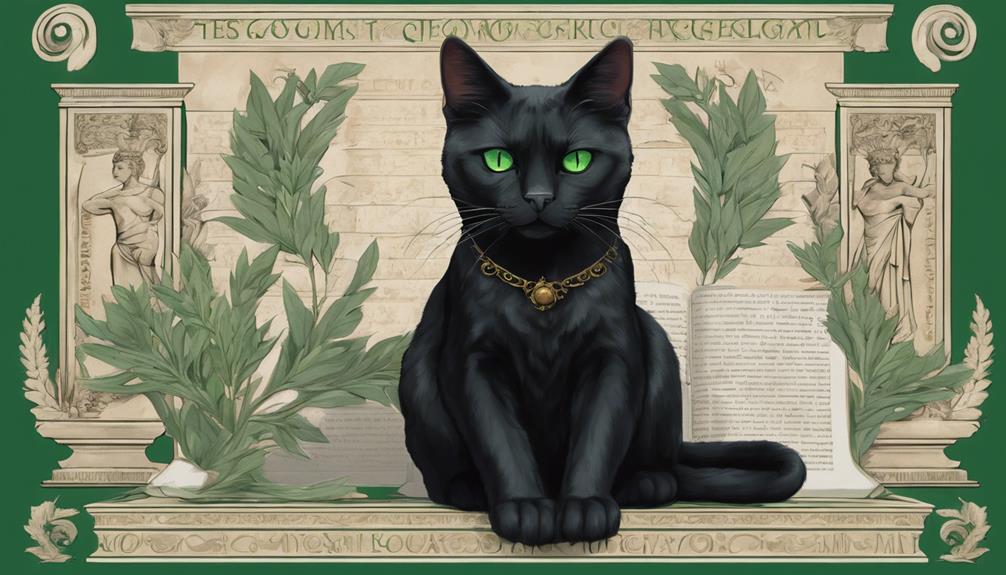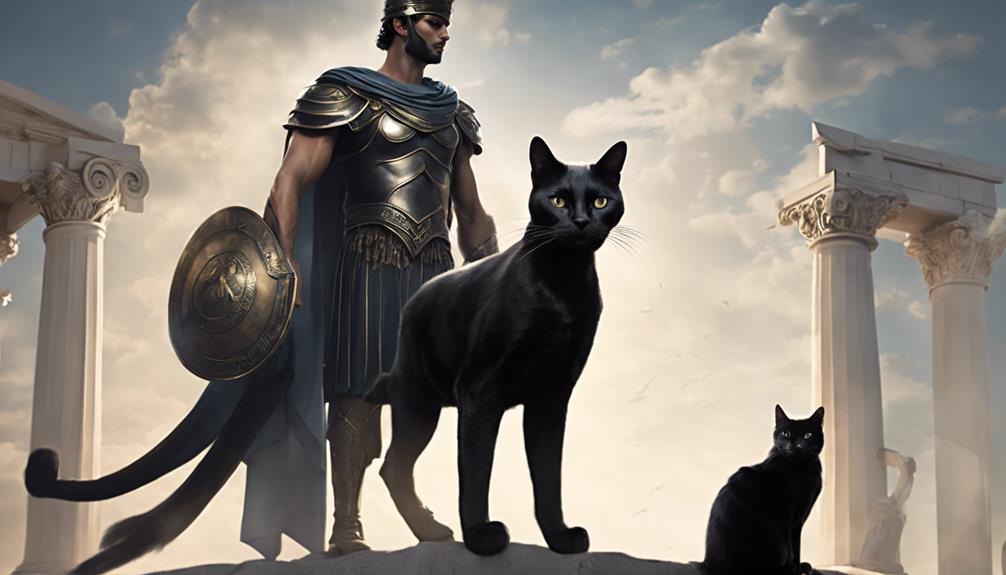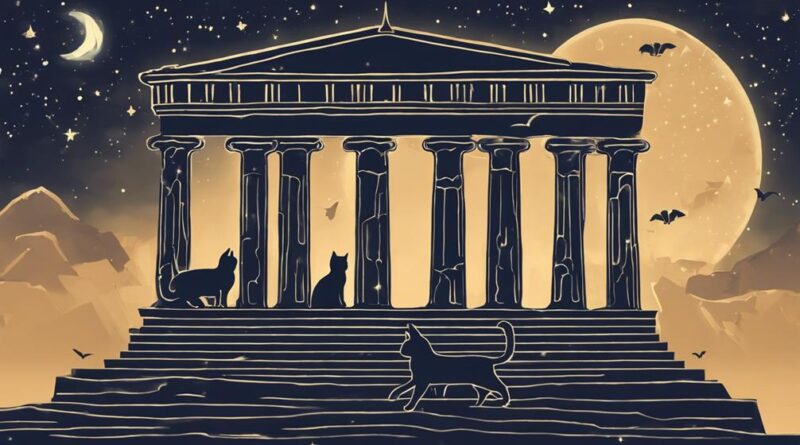9 Fascinating Tips: Cats in Greek History and Myths
Immerse yourself in the captivating world of cats in Greek history and myths, where these majestic creatures were revered as sacred beings embodying grace and mystery. Discover their significant role in rituals and worship practices, serving as protectors of sacred places and earthly manifestations of gods like Artemis. Explore how they symbolized good luck, fortune, and protection, believed to bring blessings and ward off evil spirits. Unravel the intricate tapestry of ancient Greek beliefs and superstitions surrounding cats, reflecting the enigmatic nature of felines and their mystical connections to deities. Let their stories in art, literature, folklore, and heroic tales enthrall your curiosity.
Cats as Sacred Animals in Greece
In ancient Greece, cats were revered as sacred beings, embodying grace, mystery, and the divine presence in the earthly realm. Cats held a significant role in rituals and worship practices. They were often seen in temples, where they roamed freely, considered as earthly manifestations of the gods. Greek mythology portrayed cats as protectors of sacred places, with their presence believed to bring blessings and good fortune.
During religious ceremonies, cats were included in offerings made to various deities. It was believed that their presence enhanced the connection between the mortal world and the divine realm. Cats' behavior, such as their agility and nocturnal activities, was interpreted as signs of their closeness to the spiritual world. People in ancient Greece would often observe cats closely during rituals, looking for signs and omens in their actions.
In temples dedicated to goddesses like Athena, cats were especially revered. The feline companions were considered sacred to the goddess of wisdom and warfare, symbolizing her qualities of intelligence, independence, and cunning. The presence of cats in these temples was seen as a symbol of protection and guidance, with the animals being cared for and respected by priests and worshippers alike. The bond between cats and the divine in ancient Greece was deeply intertwined, showcasing the reverence and importance these animals held in religious practices and beliefs.
Cats and the Goddess Artemis
Cats featured prominently in the realm of mythology, particularly in their association with the goddess Artemis, showcasing their revered status in ancient Greek culture. Artemis, the goddess of the hunt, wilderness, and wild animals, was often depicted with her feline companions by her side. These cats weren't mere animals but were seen as divine protectors, embodying the grace, agility, and independence that Artemis herself exemplified.
Artemis's feline companions symbolized her strong connection to the natural world and the untamed aspects of existence. Cats, known for their mysterious and enigmatic nature, mirrored the goddess's own mystical connections. In Greek mythology, Artemis was fiercely protective of her sacred animals, including the cats that roamed her sacred groves and temples. These cats were believed to be under her watchful eye, ensuring the sanctity of her domains.
The bond between Artemis and her feline companions was one of mutual respect and admiration. Cats were revered for their ability to move swiftly and silently, attributes that Artemis valued in her role as a skilled huntress. The presence of cats in Artemis's mythology underscores the importance of these creatures in ancient Greek society and highlights their significance in the divine realm.
Cats in Greek Mythological Creatures
With the goddess Artemis's close association with feline companions established, the realm of Greek mythology expands to include cats as significant players in the pantheon of mythological creatures. Mythical feline beings hold prominent roles in ancient Greek myths, often embodying traits of both elegance and ferocity. One such creature is the Sphinx, a mystical being with the body of a lion and the head of a human, known for posing riddles to travelers. This hybrid creature symbolizes the enigmatic and unpredictable nature of felines in Greek mythology.
Feline creatures in myths aren't limited to the Sphinx alone. The Chimaera, a fearsome beast with the head of a lion, the body of a goat, and the tail of a serpent, is another example of the intriguing portrayal of cats in Greek folklore. This creature's representation combines various elements of strength, cunning, and mystery, mirroring the multifaceted essence often attributed to cats in ancient times.
Furthermore, the Catoblepas, a creature with the body of a boar and the head of a lion, is described in Greek mythology as having a deadly gaze capable of petrifying those who meet its eyes. This mythical feline being's menacing abilities highlight the respect and fear that cats commanded in the ancient Greek world, solidifying their place as fascinating and formidable creatures within the realm of mythology.
Cats in Ancient Greek Art
Exemplifying intricate craftsmanship and divine symbolism, ancient Greek art intricately weaves the majestic presence of feline figures into its tapestry of mythological narratives. Cats in Ancient Greek Art weren't merely portrayed as animals but often held deeper symbolic meanings, reflecting the profound beliefs and cultural significance attributed to these creatures.
Here are three intriguing aspects of feline representation in Ancient Greek Art:
- Feline Symbolism: In Greek art, cats were often associated with various deities and mythological beings. One prominent example is the goddess Artemis, often depicted with sacred cats due to their connection to her as a symbol of protection, independence, and nurturing qualities. Additionally, cats were linked to the goddess Hecate, symbolizing magic, mystery, and the supernatural in ancient Greek beliefs.
- Historical Depictions: Cats frequently appeared in various forms of art, including pottery, sculptures, and mosaics. These depictions showcased the reverence and admiration Greeks held for cats, illustrating them in scenes of everyday life, religious ceremonies, and mythological tales. The intricate details and lifelike representations of cats in these artworks highlight their significance in Greek society.
- Artistic Evolution: Over time, the portrayal of cats in Greek art evolved, reflecting changes in artistic styles and cultural influences. From the early geometric patterns to the elaborate Hellenistic sculptures, cats remained a recurring motif, showcasing the enduring fascination with these enigmatic creatures throughout different periods of Greek art history.
Cats as Symbols of Good Luck
Associated with various deities and revered for their mystical qualities, cats in Ancient Greek culture were often viewed as symbols of good luck, embodying a sense of fortune and protection in mythological narratives. Cat symbolism in Greek mythology frequently tied these felines to concepts of prosperity and fortune. Cats were believed to bring blessings to those who cared for them, and their presence in rituals was thought to attract good luck and ward off evil spirits.
In Greek rituals, cats played a significant role in invoking favorable outcomes. During ceremonies, cats were often present, symbolizing luck and acting as protectors of the participants. It was believed that the mere presence of a cat could enhance the chances of success in various endeavors, as their mystical aura was thought to bring about positive energies.
Furthermore, cats were often included in rituals seeking blessings from the gods. Their association with luck made them valuable companions during these sacred practices. The Greeks believed that cats had the power to influence the divine forces in favor of those who revered them. Their role as symbols of good luck in these rituals underlined their importance in Ancient Greek society, where they were held in high regard for their perceived ability to bring fortune and protection to those who honored them.
Cats in Greek Superstitions
In Greek superstitions, cats were often regarded as mysterious creatures with the ability to influence fate and bring about both good and bad omens, adding a layer of complexity to their already revered status in Ancient Greek culture. Cats held a significant place in Greek beliefs and superstitions, shaping the way people viewed these enigmatic feline beings.
- Guardians of the Underworld: Greek beliefs held that cats had a strong connection to the spirit world. They were thought to be guardians of the underworld, able to navigate between the realms of the living and the dead. This belief added to the aura of mystery surrounding cats in Greek culture.
- Harbingers of Good and Bad Luck: Cats were seen as symbols of both good and bad omens. Depending on the circumstances, encountering a cat could either bring blessings or misfortune. This duality in their symbolism made cats a subject of fascination and caution in Greek superstitions.
- Agents of the Divine: In Greek culture, cats were sometimes associated with certain deities like Hecate, the goddess of magic, witchcraft, and ghosts. Cats were believed to embody aspects of these divine beings, further elevating their cultural significance and mystical allure.
The intricate web of Greek beliefs and superstitions surrounding cats showcases the deep-rooted cultural significance these creatures held in Ancient Greece. Their portrayal as mysterious entities capable of influencing human destiny added a captivating layer to the rich tapestry of Greek mythology and folklore.
Cats in Greek Literature

Within the realm of Greek literature, felines often emerge as enigmatic figures intertwining with mythological narratives, captivating readers with their mysterious presence and symbolic significance. Greek literary cats play integral roles in various ancient texts, embodying diverse meanings and characteristics. One of the most notable feline characters appears in the myth of the goddess Artemis. Artemis, known for her connection to the wilderness and animals, is often depicted with a group of loyal feline companions, typically wild cats like lynxes or panthers. These creatures symbolize her fierce independence, hunting prowess, and protective nature.
Another significant portrayal of feline symbolism in Greek literature can be found in the story of the sphinx. The sphinx, a mythical creature with the body of a lion and the head of a human or a falcon, is a complex symbol representing enigmas, wisdom, and destruction. In the famous myth of Oedipus, the sphinx poses a riddle to all travelers, devouring those who fail to answer correctly. The sphinx's feline features emphasize its power, intelligence, and connection to the divine.
Cats in Greek Folklore
Folklore in ancient Greece intricately weaves tales of cats as mystical beings revered for their cunning nature and mysterious allure. Cats held a prominent place in Greek folklore, often depicted as enigmatic creatures with a touch of the divine.
Here are three intriguing aspects of cats in Greek folklore:
- Cats in Greek Rituals: In Greek folklore, cats were believed to have spiritual significance. They were often associated with various deities and were thought to possess supernatural abilities. Some rituals involved offerings to cats to seek their favor or protection. Cats were considered guardians of the afterlife, guiding souls to the underworld. Their presence in rituals added an aura of mystique and reverence.
- Cats in Greek Festivals: Cats played a role in Greek festivals, where they were honored for their perceived connections to the divine realm. During festivals dedicated to goddesses like Artemis or Hecate, cats were venerated as sacred animals. They were seen as symbols of fertility, protection, and intuition. People would adorn cats with special ornaments and treats as a sign of respect and admiration.
- Cat Symbolism in Greek Mythology: Cats were often featured in Greek myths as companions to gods or symbols of wisdom. They were associated with deities like Athena, the goddess of wisdom, strategy, and handicraft. Cats were seen as embodiments of intelligence and independence, traits highly valued in Greek culture. Their presence in myths added an element of mystery and intrigue, further solidifying their mythical status in Greek folklore.
Cats as Companions to Greek Heroes

Have cats in Greek mythology served as loyal companions to revered heroes, enhancing their tales with elements of feline mystique and symbolism? Absolutely. Greek legends are rich with stories of heroic feline companions who played crucial roles in the lives of legendary figures.
One notable example is the story of the hero Heracles and his encounter with the Nemean Lion. In this myth, the Nemean Lion, a fierce and powerful creature with an impenetrable hide, terrorized the region of Nemea. Heracles, as part of his Twelve Labors, was tasked with defeating this formidable beast. The Nemean Lion served as both a formidable adversary and a symbol of Heracles' strength and courage.
Another Greek legend that showcases the bond between heroes and cats is the tale of the goddess Artemis and her association with felines, particularly wild cats like lynxes. Artemis, the goddess of the hunt, was often depicted with a bow and accompanied by a group of loyal hunting companions, including fierce and agile cats. These cats symbolized Artemis' connection to the wilderness and her ability to protect and nurture the natural world.
In Greek mythology, cats weren't merely pets but symbolic companions that added depth and meaning to the stories of revered heroes and deities, embodying traits such as strength, agility, and independence that mirrored the qualities of the characters they accompanied.
Frequently Asked Questions
Were Cats Ever Used in Greek Military Tactics?
Yes, cats were indeed utilized in Greek military tactics. They were employed as cat spies, aiding in intelligence-gathering during Greek warfare.
Feline strategy played a crucial role in ancient battles, with these cunning creatures contributing to the success of various military campaigns. Their stealth and agility made them valuable assets in the realm of espionage, showcasing the ingenuity and resourcefulness of ancient Greek military commanders.
Did Ancient Greeks Believe in Cat Telepathy?
In Ancient Greece, cat divination was a significant part of Greek beliefs. Cats were seen as powerful symbols, with unique abilities to communicate with the divine.
The ancient Greeks believed in cat telepathy, viewing cats as mystical creatures capable of connecting the mortal world with the spiritual realm.
Cat symbolism played a crucial role in shaping the culture and mythology of Ancient Greece, highlighting the mystical and enigmatic nature of these feline companions.
Were There Any Cat Temples in Ancient Greece?
Yes, there were cat temples in ancient Greece. These temples were dedicated to cat worship and played a significant role in the religious practices of the time.
Cats held a strong feline symbolism in ancient Greece, often associated with various deities and myths. The presence of cat temples highlights the importance of cats in the spiritual and cultural fabric of ancient Greek society.
Their worship was intertwined with mythology and beliefs of that era.
Did Greek Philosophers Write About Cats?
Greek philosophers did write about cats. They observed cat behavior closely, seeing them as symbols of independence and mystery. Some philosophers believed that cats possessed a deep wisdom and connection to the spiritual world.
Through cat symbolism and behavior studies, these ancient thinkers pondered the nature of existence and consciousness. Their writings on cats reveal a fascination with these enigmatic creatures, weaving them into the fabric of Greek philosophy and mythology.
Were There Any Famous Cat Festivals in Ancient Greece?
In ancient Greece, cat worship played a significant role in their festivals. Greek festivals often had cultural significance tied to feline celebrations.
Cats were revered for their mysterious nature and were believed to have spiritual connections. These beliefs led to the creation of famous cat festivals where people would gather to honor and celebrate the presence of these enigmatic creatures in their lives.
Conclusion
In conclusion, cats have played a significant role in Greek history and mythology. They were revered as sacred animals, associated with powerful goddesses like Artemis, and even appeared in ancient art and literature. They've been seen as symbols of good luck, companions to heroes, and subjects of superstitions and folklore.
With their mysterious and independent nature, cats have left a lasting impression on Greek culture, solidifying their place in the rich tapestry of Greek mythology and history.
